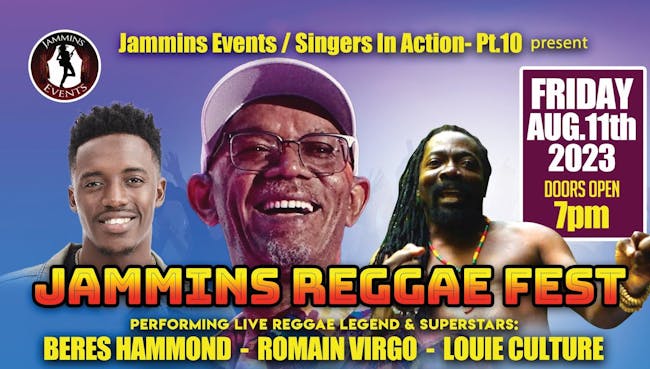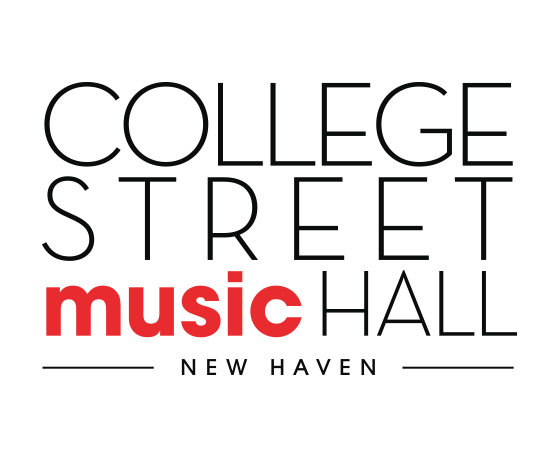Beres Hammond – Tickets – College Street Music Hall – New Haven, CT – August 11th, 2023

Beres Hammond
Romain Virgo, Louie Culture
Add to Calendar
This event is General Admission Standing Room on the Floor and Reserved Seated in the Balcony.
A portion of the proceeds will be donated to the AFUWI Scholarship Fund.
BERES HAMMOND
Don’t be deceived by Beres Hammond’s cool profile. The playful smile, the unassuming demeanor, the beard and the cap and the spectacles might lull you into forgetting that you’re in the presence of an awesome musical talent, Jamaica’s greatest practicing singer/songwriter. Beres remains cool, though he knows that he’s one of a handful of people responsible for maintaining a mighty legacy of soulful reggae music—a select group of artists like Toots and Gregory, like Dennis and Bob. “Father bless me with a song,” he pleads on the last cut of his latest album, Music Is Life, “to make the whole world sing along. Regardless of the race, regardless of the taste.” In the year 2021, the blessings just keep coming, and the world is just starting to catch on.
Over the course of five decade career, Beres has poured his smoky-sweet voice—an instrument of subtlety and power reminiscent of an Otis Redding or a Teddy Pendergrass—over every kind of riddim track, from the funked-up reggae jams of the ’70s fusion band Zap Pow to the lush instrumentation of his 1976 album Soul Reggae to the spare digital beat of his 1985 dancehall breakthrough “What One Dance Can Do.” In 1990, his album A Love Affair for Donovan Germaine’s Penthouse label raised his popularity to new heights. Cuts like “Tempted To Touch” and “Who Say” with Buju Banton are still as effective in the dancehall today as they were as pre-releases. The ’90s proved to be Hammond’s decade, during which he blazed a trail of modern classics for a variety of producers, from the strugglers’ anthem “Putting Up Resistance” (Tappa) to lovers’ laments like “Come Back Home” (Star Trail) and “Double Trouble” (Steely & Clevie).
Beres started building his home studio in the early ’90s, before it became the trend among successful reggae artists to take over their own production duties. But his spontaneous method of composing, and his unwillingness to compromise, made a home studio the natural choice. Although the trend of self-production as a whole has, at times, diluted the quality of music coming from isolated individuals poking at computer keyboards, Beres’s little music room attracts a steady stream of Jamaica’s most talented musicians.
“The room have a sound,” he says of his simple but effective analog sound lab. “Some of them say it remind them of the old days at Channel One.” Ace session bands like the Roots Radics, drummers like Sly Dunbar, hornsmen like Dean Fraser, and a variety of talented singers and deejays, both veterans and up-and-comers—all come to “hold a joy”, play a game of Ludi, share a smoke and a laugh, and to make music together. “When they go in my studio, they don’t want to come out,” Beres explains with humorous understatement. But he knows all too well that the survival of classical reggae music depends on such oases of creativity. “We a try bring back the golden days of the Seventies, when reggae had the live drums and horn sections.”
The rub-a-dub groove of his smash single “They Gonna Talk” (track two on Music Is Life) was recorded right there in the home studio by Flabba Holt and Style Scott of the legendary Roots Radics, whose riddims are clearly as powerful today as when they were the backing band for giants like Gregory Isaacs. No computer can rock quite as steady as these veteran musicians. “I personally don’t believe in a whole heap of technology business,” says Beres. “It’s all about what you have to offer. As long as your vibes is there, that’s what the people feel.”
Beres’s sophisticated musical taste is well suited to translate easily across cultural divides, yet the international reggae massive has remained his most loyal fan base. He did collaborate on Maxi Priest’s first American hit, “How Can We Ease The Pain,” in 1990. A brief encounter with Elektra Records in 1994 yielded the excellent but under-appreciated album In Control with its R&B-flavored single “No Disturb Sign.”
In 2002, the album Music Is Life was nominated for the Grammy Award for Best Reggae Album. The album contained two of what would become Hammond’s top songs, “Rock Away” and “They Gonna Talk.” The album was supported by a sold-out concert at New York City’s storied Hammerstein Ballroom at the Manhattan Center on April 21, 2001.
The album A Moment In Time, released in 2008, and One Love, One Life, released in 2014, respectively, topped the Billboard Reggae Albums chart, with “I Feel Good” and “In My Arms” becoming the standout tracks from each album. One Love, One Life was nominated for the 56th Grammy Award.
In 2018, the album Never Ending, debuted at number one on the Billboard Reggae Chart again and was also number one on iTunes Reggae Chart in the US, UK and Japan, lodging another hit song “My Kinda Girl” among his career standouts.
On February 28, 2021, Harmony House and VP Records presented Love From A Distance Live, a streaming event for Hammond’s global fanbase during the COVID-19 pandemic quarantine. The event, featuring special guest appearances by Buju Banton, Marcia Griffiths, and Popcaan, drew over 120,000 viewers from around the world and resonated as one of the great achievements of his long and storied career.
ROMAIN VIRGO
Born in Stepney, Saint Ann Parish, Jamaica in 1990, reggae singer Romain Virgo found his star rising early in life as a 16-year-old contestant on the televised singing competition show All Together Sing. He won the Digicel Rising Stars competition at the age of 17, scoring an enormous cash prize and a recording contract with . Barely out of high school in 2007, Virgo began cutting singles, scoring hits with his style that relied heavily on classic lovers rock and roots reggae. His self-titled debut full-length came out in 2010 on , with follow-up The System arriving in 2012 on the same label. In 2014, Virgo's reggae re-imagining of 's "Stay with Me" was a massive hit, racking up millions of online plays and climbing the charts. His third album, LoveSick, arrived in 2017. ~ Fred Thomas, Rovi
Links: Official Website | Facebook | Instagram | Twitter | Spotify
LOUIE CULTURE
b. c. 1960, Portland, Jamaica, West Indies. Culture began his career in the dancehall while still at school. His ability led his teachers to advise him that he should pursue his studies in higher education on completing his schooling. His love of music and the dancehall led him to pursue a career in the Jamaican recording industry. He was influenced by the DJs of the early 80s including Nicodemus and Bobby Culture it was the latter who inspired Louie’s Culture appellation. His initial studio experience was with King Tubby who released a combination tune with Wayne Ranks, ‘Rat A Bodda We’. The song led to a series of lesser known hits in combination with Ranks. In the late 80s Ranks migrated to the USA and settled in New York. Culture remained in Jamaica but his notoriety as part of a duo resulted in local producers being reluctant to record him as a soloist. Disillusioned with the unfavourable attitude of the Jamaican producers Culture decided to check out the industry in London, England, where he remained for a number of years. He was later inspired to try out the New York reggae scene before returning to Jamaica in the mid-90s. It was his session with Dave ‘Rude Boy’ Kelly that proved most successful, notable hits including ‘Old Before Your Time’, ‘Malfunction’, ‘The Revolution Song’ and, in combination with Wayne Wonder, ‘Excellence’. He also released ‘In This Together’ with Luciano and Terror Fabulous. Culture recorded with Colin Fat, Bobby Digital and John John (son of King Jammy). Culture’s crowning glory was ‘Ganga Lee’, produced by John John, a track that has become his anthem (‘No man can decide my destiny - only I can decide my own for me - cos I’m a ol’ ganga lee - well I was born to be free - me a ol’ ganga lee’ relished comparable accolades). The rhythm provided Bounty Killer with his classic hit ‘Down In The Ghetto’. Culture also recorded a number of dub plates with Rory and Wee Pow of the Stone Love crew who regrettably were unable to capitalise on its success. Following his association with Stone Love Culture formed an allegiance with Philip ‘Fatis’ Burrell and the Exterminator crew. A series of hit singles followed including, ‘After So Many Years’, ‘Original Days’ and ‘How Long’. These tracks were featured alongside two combination tunes with Sizzla and the sublime ‘I’m Fighting’ on Culture’s debut, Better Tomorrow.
College Street Music Hall
238 College Street
New Haven, CT, 06510
